‘We are one family’ – Ukraine’s inclusive women’s football club NRG fights on as war rages

A few months ago, NRG joined several other inclusive women’s clubs playing in a tournament in Georgia in support of Fare’s #FootballPeople campaign. Now the Kyiv-based team’s players are scattered across Ukraine and wider Europe. Co-founder Anna Tregubova tells Sports Media LGBT+ how the spirit and sisterhood of NRG is a source of motivation amid the horror of war…
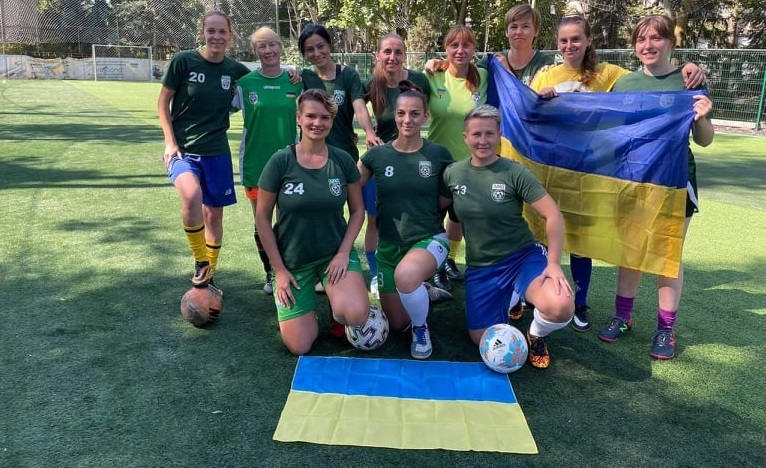
“In case of any explosions, I shall sit in the corner…”
Shortly after connecting with Sports Media LGBT+ via Zoom, the air raid siren and accompanying warning message sounds in the building in Dnipro where Anna Tregubova is located. She picks up her laptop and moves across the room, well away from the window.
Dnipro is the largest of the Ukrainian towns and cities closer to the eastern frontlines of the Donbas region. It continues to be a vital hub for aid and a destination for those fleeing from the invasion. Positioned within a horseshoe of Russian-controlled territory, the threat of attack is constant.
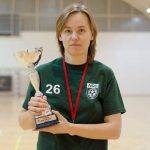
Tregubova works in logistics for a humanitarian organisation. She is also one of the co-founders of NRG, a football club for women based in Kyiv. From its very beginning in 2003, the club placed an emphasis on inclusion; on bringing women together through a shared passion for sport. As recently as October, a group of NRG players travelled to Georgia for a tournament, supported by the Fare network through its #FootballPeople campaign for social change and diversity. Now, however, the club’s members are scattered across Europe as a result of the war.
“It’s really hard to believe that it’s happening in our country in the 21st century,” says Tregubova. “You see the explosions and still you cannot believe it, because it’s Europe and no one expected that.”
Amid the devastation and grief, the NRG spirit remains strong, as evidenced by the club’s social media output. ‘We are one family and the war cannot separate NRG – together to victory!’ reads one post from March. Another carries the message: ‘NRG is holding on because we are Ukrainians! We are unbreakable!’ The images shown are of players during happier times – often marking their birthdays – or of troops and volunteers, thanking them for their dedication to defending the country.
Sports Media LGBT+ reached out to NRG to ask if we could help to raise awareness about how its club members are supporting each other during these unimaginably awful times. We were also keen to learn how the wider inclusive sports community in the UK and abroad might be able to offer assistance. We are immensely grateful to Anna for agreeing to this interview...
JH: Anna, thank you so much for taking time out to speak with us. Could you tell us about the background of NRG?
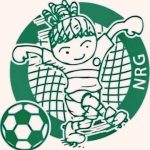
AT: Yes, I’m the NRG club president and one of its founding members. We started at a very amateur level but within a couple of years, we understood that we wanted to create something bigger. We learned about EGLSF (the European Gay and Lesbian Sport Federation) who invited us to their general assembly in Budapest in 2006 and that’s where we started to think of ourselves as more than just playing women and girls’ football.
JH: There’s an article on the Fare website from 2012 in which one of your co-founders Alla explains how regulations in Ukraine meant NRG couldn’t state that it was an LGBTQ+-inclusive club...
AT: That’s right. It wasn’t easy when we started, and it hadn’t got much easier by 2012. More recently, it had been getting a little better in Ukraine – we have Prides, but it’s still dangerous and we don’t participate as a club.
We are more like an ‘LGBT+-friendly’ club. Over time, some of our founders left, and other people joined. But we have always been open to everyone. Inside the club, there’s a very friendly atmosphere. People can be themselves and it’s something they enjoy, regardless of sexual orientation or age or anything else. A club in which everyone is comfortable to be themselves – that’s the main aim.
Now, we have only one football team with a club manager. Because of her, NRG is still alive. Recently, my work has meant that I’ve been travelling all around the world so it’s not possible for me to be as close to NRG as before. But when I’m in Kyiv – and from time to time I am – I’m still with them and sometimes I even play, which is not so easy now because of age!
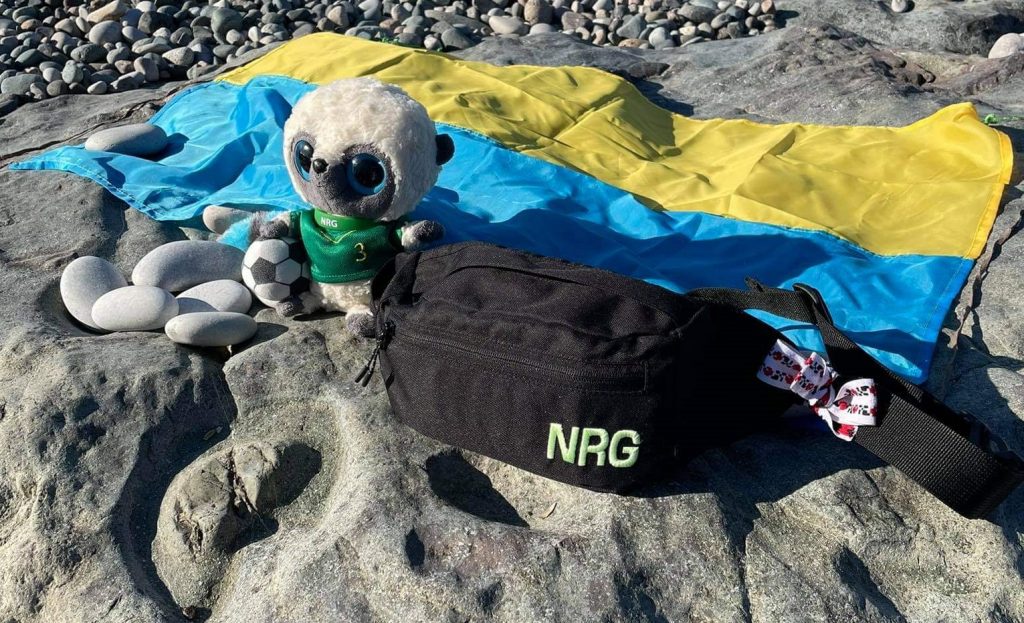
JH: Over the years, NRG has built up friendships with many other women’s clubs. Tell me about those connections.
AT: They are mostly in Poland, where we have a lot of people who support us, especially now. We’ve visited there many times and there’s this great connection. Before that, we were close with Russian clubs – but that’s not happening anymore, for obvious reasons.
A lot of the teams we know were supposed to be at the tournament in Georgia in October but not everyone could make it during Covid times. Still, NRG was extremely happy to be there. We had been organising our own tournament for 2022 and we were going to invite the teams from Georgia, Poland and the Baltic countries. But who knows what this October will bring? For now, we’re still aiming to stage the tournament but to be honest, we’ve started becoming quite pessimistic about that.
JH: What has been your personal story since war broke out in February?
AT: I was in the Democratic Republic of Congo at the time, working for my organisation. I terminated my contract with the mission because I couldn’t be so far away from Ukraine, with my mum and pets being in Kyiv.
The first bomb in the city landed just a few blocks from my house. Of course, I was extremely panicked and worried.
I had to travel for three days just to get back because all the flights were cancelled. On the way, I got an offer from my organisation to join the Ukrainian mission so I feel lucky to have got this job. I stayed in Lviv for a week planning my trip to Kyiv because it wasn’t clear how to get in and after that, it would be even harder to get out.
That’s how it turned out. I have a video shot at Kyiv station, showing people storming trains. For my 70-year-old mum who’s not very healthy now and for our pets, it just wasn’t possible. A normal train carriage is for 50 people and it was like 500 on a carriage there. People were standing and laying everywhere.
Again, I got lucky because some friends gave me a car of theirs. It took me two days instead of five hours to drive from Kyiv to Lviv with my family and the animals. The car rental cost would have been crazy – 10 times more than normal because of the refugees. As far as I remember now, about 6.5m people have left their houses and a lot of them have gone to western Ukraine. It’s not possible to rent somewhere there unless you have crazy money so most people live in collective shelters.
I’m extremely fortunate to have this job because they’ve provided me with an apartment in Lviv. My mum is staying there, with my pets. Of course, she wants to come back to her home in Kyiv because she misses all her stuff, but she’s kind of OK.
In our situation, it’s more than fine right now. At least we have a place to stay. If not, I would probably have gone to Europe because I don’t see any options here. We’re grateful to Poland, our neighbour and best friend now. The Polish people have helped a lot. If the border had been closed, we would be trapped completely here – and there would be more deaths, of course.
JH: What can you tell us about the stories of your fellow NRG players?
AT: Everyone now is spread all over Ukraine, and a few people are out of the country. That’s surprising because I expected that a lot more of them would leave. A few have volunteered for the army – not fighting I would say, but they are helping. Honestly, I’d gladly do the same but I can’t afford that, being a humanitarian worker.
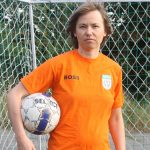
We all support each other – we have a Facebook group where we send messages. It’s always, ‘hey, how are you, how is everything, how is the family’ – but at times, it’s hard.
For example, our goalkeeper – her mother died in Odesa and she couldn’t go back because there’s no transportation. She couldn’t even attend the funeral. We try to support her around that, if it’s even possible.
And our former ‘keeper, her parents are in Chernihiv and it’s been a disaster there. It’s only two hours from Kyiv but she couldn’t visit them because it was surrounded by Russians. There’s just one road but it had mines, so it’s not accessible. Of course, it drives her crazy. There are no words to support someone in a situation like that. At any moment, you could lose your parents.
JH: World football continues to show strong, visible solidarity with Ukraine. Have those images reached you?
AT: Football has a huge impact and we’re very grateful for that. It’s always in the news that teams in Sweden and England have come out for the beginning of their games accompanied by our national colours.
Everyone has Ukraine flags and there are amateur teams in Europe welcoming and hosting our amateur teams. We at NRG received quite a lot of offers of help, some from people we knew and some we didn’t. Somehow, we have all managed by ourselves but that doesn’t matter – it’s the fact that people are offering their help for free, to people that they have no idea who they are. That’s worth a lot to us.
JH: We’ve read here in the UK of the heightened fears of LGBTQ+ people in Ukraine. What can you tell us about their situation, before and during the war?
AT: NRG was never an openly LGBT+ club because of safety reasons. We’d get so many comments like ‘sport is for men’ and ‘why do these women even play’ – when we had our tournaments, guys would sit watching us and we would hear these comments. If you had said also that it was lesbians playing… well, we could never say that because we would be immediately beaten up.
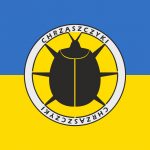
I remember once when we visited KS Chrzaszczyki in Warsaw and we participated in Gay Pride with them there. That would have been seen as unacceptable for us as a club in Kyiv but in Poland at the time, it felt extremely safe. We were so jealous. In that sense, Poland is more developed than Ukraine – our country is not as religious as theirs but we are more ‘post-Soviet’ than them, and people here don’t have that awareness. Sexism is still a much bigger problem here, unfortunately.
You won’t have heard as much in the media about homophobia in Ukraine compared to Poland and Hungary because we aren’t part of the EU. Our legislation may be better than in Poland but public opinion is much worse, at the same time. In Kyiv, it’s a different story – that’s always the case in the capital, there are a lot of foreigners and more freedom – but in smaller cities, there is nothing.
For now, suffering is equal among all the people. If Putin brought his nonsense and propaganda here, then yes – we have enough homophobia in our country as it is but it’s much worse in Russia with their laws. Anyway, the people of Ukraine don’t believe that will happen. We will win this war – everyone thinks that – and the Russian laws will stay in Russia.
JH: What gives you and your NRG club-mates hopes?
AT: There’s a lot of hope. People aren’t depressed – they are ready to fight, and help each other. We show this on social media. We try to do the best we can.
In our messages, we share lots of jokes and memes, pictures of tractors taking on the Russian army, that sort of thing. Without humour, it wouldn’t be possible to survive. You start your day reading the news – maybe the city you know still exists or maybe it doesn’t.
Everyone volunteers to help in any way they can, and that’s a huge inspiration. For example, we have a huge problem at the moment with medicine, such as for cancer patients, because it’s just not available in Ukraine. Despite this, and the worse the situation gets in Ukraine, the better people become.
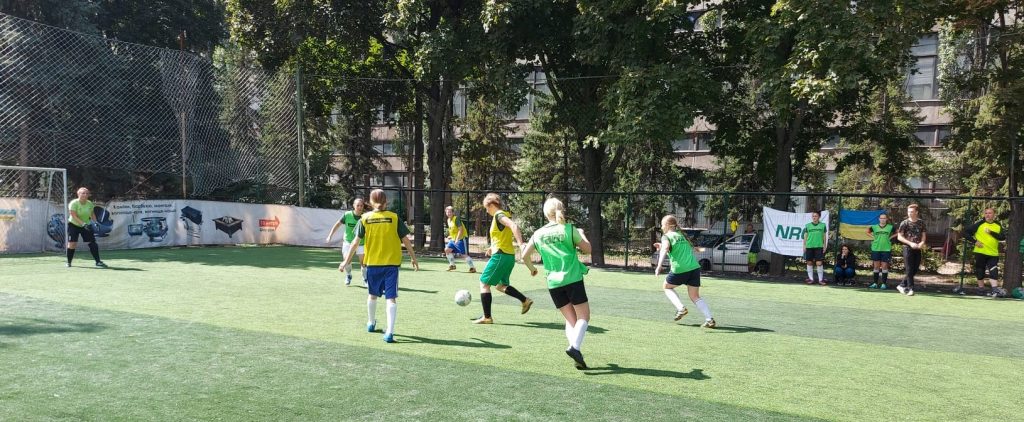
JH: How can we help?
AT: Anything that raises awareness about what’s happening here – and I can easily call it genocide – helps us. Also, to promote that Ukraine is a part of Europe – we don’t want to be part of Russia. If Europe can somehow defend us or help us to fight, then Europe will be better for it. Any words of support to Ukraine said anywhere, in any event, are extremely valuable to us.
It’s important to maintain this focus on us but it will not last forever, and I understand it very well. It gets less and less, and then people prefer to forget. It happened in Syria, for example, and I worked there so I know from the inside. It’s still happening – people dying, thousands of them – but no one was interested to hear that anymore because they were tired of it, and they have different problems.
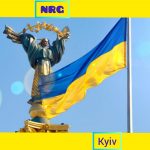
But the problem in Europe is one of a rich society, I would say. People can’t believe that it could happen to them but it really can. If Ukraine were to lose this war, then I’m 100% sure that Putin would go further. First, it will be the Baltic countries – they’re part of NATO but it will not stop him at all. Then it will be Poland, Czechia and Slovakia as before, and then who knows where he stops?
It is a European problem and I don’t think Europe realises that yet. Poland does because they have the experience but by then, it would be a world problem. Putin should be stopped but I still don’t think people understand it at this point.
JH: Naturally, you must hope NRG can return to playing football when it’s safe to do so, but that seems a long way off yet…
AT: There is no time to play, and no opportunities to do so at the moment. I think one person in our club found a boys’ team and joined them for a while! But that’s stopped because it’s too dangerous. We just wait and hope to resume training one day but for the time being, sports is dead here for us.
Athletes are dying in the war too – there have been several. A kickboxing world champion (Maksym Kagal) died just recently. All we can ask is that European sports keep raising awareness – we see the pictures from the English leagues, of Ukrainian flags all around. This is really touching for us. It helps a lot.
We send our gratitude and best wishes to Anna and NRG, from all our inclusive sports community. Sports Media LGBT+ has donated to People In Need’s Ukrainian Emergency Appeal and also PinkNews’ GoFundMe titled ‘LGBTQ+ Refugees Welcome’ which benefits OutRight Action International’s LGBTIQ Ukraine Emergency Fund and Micro Rainbow. Please give generously.
Sports Media LGBT+ is a network, advocacy, and consultancy group that is helping to build a community of LGBTQ+ people and allies in sport. We’re also a digital publisher. Learn more about us here.
We’re interested in your news and stories. Share with us and tap into a worldwide audience through our Google News affiliate website – which pulled in over one million impressions in 2021 – and our popular social channels with over 10,000 followers. Contact us to discuss how we can help you.


